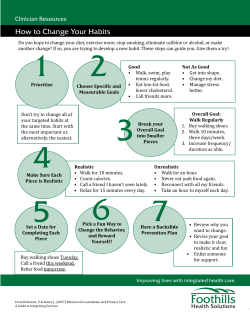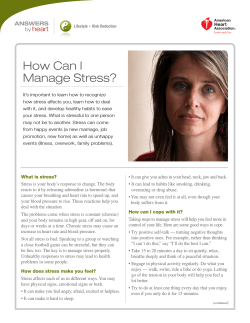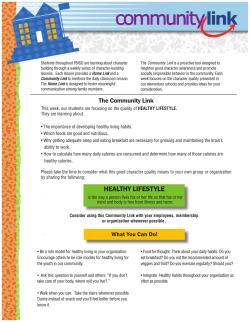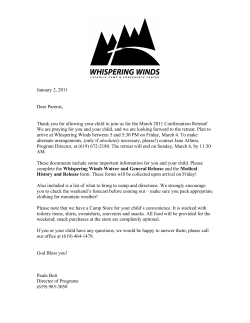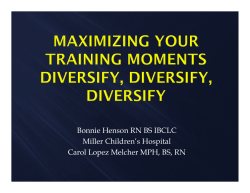
Feb 2015 - Health HQ
E!!e one E R F tak ase ple February 2015 HEALTH HQ “Quality Caring” 95 Nerang Street Southport 4215 P: (07) 5526 4444 F: (07) 5531 3697 W: www.healthhq.com.au Follow Health HQ on Dr Norman Hohl MBBS, FRACGP, FAFPHM, DTM&H, CTH Good health starts at home Dr Simon Thatcher MBBS, CTH Dr Michael Read MBBS Dr Donna Armstrong MBBS Dr Neil Chorley MBBS, FRACGP, FACCRM, FACSM Dr Bill Cassimatis MBBS Dr Danika Fietz MBBS, FRACGP, M.Med (Skin Cancer) Dr Craig Thompson MBBS, FRACGP, FACRRM, MPHTM, CTH PRACTICE STAFF Nicky McClelland (Practice Manager) Mirja, Kim, Kris,Viv, Margie, Jenny, Kim C, Lindsey and Emily (RN) Brenda (AIN), Ilana, Dorothy, Rosalie, Heidi, Charlotte and Christina (Reception) Janet (Financial Assistant) Eating together as a family is associated with positive outcomes for children’s weight and attitude towards food. Previous research has found that children who regularly eat with their families in a calm and positive environment consume more fruits and vegetables, have better weight control and have improved psychosocial health. Researchers investigated the social dynamics at the family dining table in an attempt to explain the health benefits associated with dining as a family. They watched video footage of 120 families during their meals over eight days. A significant relationship between family dynamics at the dining table and a children’s weight was observed. Children with a healthy weight more commonly ate in dining environments with a positive mealtime dynamic involving group enjoyment and positive parental reinforcement. A less positive family environment, shorter meal times and more meals eaten outside of the dining / kitchen space were common characteristics of families with overweight children. A link between meal environment and children’s weight cannot be ascertained from this study. These findings do, however, add to the growing body of evidence that suggests that a positive family environment, including encouraging parental reinforcement and dining as a family, may cement lasting good health habits in children. Home is not only where the heart is, but also where good health starts. For reference: Berge, J et al. Childhood obesity and interpersonal dynamics during family meals. Pediatrics 2014; 134: 923 – 932. HOURS AND SERVICES Consultations by appointment. If you need to be seen urgently or need a long consultation, please ask when you book. Home visits within 5km can be arranged if necessary. Mon, Tue, Wed, Fri 8:30am-5:00pm Thursday 8:30am-6:00pm Saturday 8:30am-12:30pm AFTER HOURS CARE GP & Home Visits: Chevron After Hours (07) 5532 8666 Hospital: Pindara Emergency Centre (07) 5588 9000 In a serious emergency, call 000. VALUABLE WEBSITES FOR QUALITY INFORMATION www.travelmedicine.com.au www.healthinsite.gov.au Inside • • • • The benefits of a weekend cheat Milk hydration Menu: Low-fat cheesecake DID YOU KNOW? Exercise powers the mind • Clever crossword • Junk food bad for teen’s IQs • Dr Norman Swan: How are your New Year’s resolutions going? • myth vs. fact: Physical activity and alcohol • PRACTICE UPDATE PLEASE NOTE: In the story titled ‘COPD: A treatment for me?’ the phone number listed at the bottom of the story should be 1800 301 260 (we had it listed as 1800 301 206). The benefits of a weekend cheat Making healthy dietary changes and sticking to them is not easy. If people feel as though they are depriving themselves then they are more likely to give up or to binge on junk food when the going gets tough. Allowing oneself a ‘cheat’ day has been proposed to potentially minimise the feelings of self-deprivation that may arise from following a strict diet. People’s lives tend to follow a weekly routine whereby weekend routines differ quite significantly from weekday routines. Researchers have proposed that it may be beneficial to have our diet follow a similar pattern. A study followed the daily weights of 80 adults over a 10-month period. Participants’ weights were highest on Sunday and Monday, with weight gradually decreasing throughout the week. This suggests that people allowed themselves a cheat day over the weekend or were not as strict with their eating habits on the weekend in general. After 10 months, people were divided into those who lost more than three percent of their body weight, those who remained the same, and those who gained over one percent of their body weight. Those who lost weight showed a weekly weight fluctuation that peaked on the weekend and decreased during week. This rhythm was not as pronounced in the other two groups. This was a small study so results need to be interpreted with caution. Nevertheless, it adds merit to the theory that people who allow themselves the occasional treat may better sustain a healthy diet for the long term. Treating yourself to unhealthy foods occasionally should not be viewed negatively and should not cause someone to lose motivation. If anything, a weekend cheat could assist in long-term weight management. For reference: Orsama, A et al. Weight rhythms: weight increases during weekends and decreases during weekdays. Obesity Facts 2014;7:36-47. Milk hydration With intense exercise often comes profuse sweating, an important bodily function that helps to control body temperature. However excessive sweating and fluid loss can have detrimental effects on people’s health in reducing muscle power and mental reasoning. It’s therefore important to rehydrate adequately after intense exercise to replace lost fluids. Sports drinks are a common choice for post-exercise hydration but there may be a better option. Australian researchers looked at the capacity of a range of beverages to restore fluid levels after strenuous exercise. On four occasions, a group of athletes completed an intense workout on a stationary bike in heavy clothing. After each session they were weighed and were found to have lost almost 2% of their body weight. The athletes were then given a beverage to rehydrate and were weighed three hours later. The beverages included a standard sports drink, full fat cow’s milk, soy milk and Sustagen sport (a liquid meal replacement beverage containing water, sugar, electrolytes, protein, vitamins and minerals). Sustagen, soy milk and cow’s milk were all found to perform better than sports beverages, with Sustagen being the best of the bunch. This research suggests that, when it comes to restoring fluid levels after strenuous exercise, milk may be as good, if not better than sports drinks. In addition to restoring fluid levels, milk products may be better for our health, with many sports drinks being loaded with high levels of sugar and sodium. For reference: Besbrow, B et al. Comparing the rehydration potential of different milk-based drinks to a carbohydrate-electrolyte beverage. Applied Physiology Nutrition and Metabolism 2014; 39: dx.doi. org/10.1139/apnm-2014-0174. 5. Beat egg whites in a separate bowl until they form soft peaks 2 teaspoons freshly grated lemon zest 6. Fold egg whites carefully through the cheesecake mix • 2 tablespoons lemon juice 7. • ¼ teaspoon salt Add lemon zest, juice and salt to mixture and stir well, then pour mixture into tin on top of crust • Berries (fresh or frozen and thawed) 8. Bake in oven for 45 – 55 minutes 9. Leave to cool for 10 minutes, top with berries and serve • 2 large eggs • 3 large egg whites (yolks discarded) Good Health on the Menu • Low-fat cheesecake A weekend treat that won’t chew up all of your calories. Ingredients: • 1 ½ cups almond meal • ½ cup crushed calcium-fortified muesli • 1 tablespoon canola oil • 110g reduced-fat cream cheese • 2 cups light ricotta • ½ cup non-fat plain yoghurt • 1/3 cup corn starch Method 1. Preheat oven to 180 degrees Celsius 2. Combine the almond meal, muesli and canola oil and press flat into greased cake tin (or individual ramekins for single serves) 3. Mix cream cheese, ricotta and yoghurt in a bowl 4. Add corn starch and the two eggs (with yolk) DID YOU KNOW? Exercise powers the mind Exercise benefits our health in so many ways both physically and mentally. Regular exercise, at least three times per week, can reduce the risk of a number of chronic diseases including dementia. Exercise helps preserve brain tissue by increasing the blood flow and activating the stem cells that help to renew nerve cells. Researchers extended this to see if exercise can help with learning and memory in the short term. A group of university students were asked to complete a series of learning tasks that tested recall speed and complex situation and context learning. Prior to the tasks, they ran and walked up and down a corridor for five minutes. While exercise didn’t affect the speed task, it benefitted the tasks that required complex memory formation. More research is needed to uncover the full extent of associations between exercise and memory. Nevertheless, there’s no question that exercise is great for your mind and your body so it may be worth including short exercise breaks in your timetable when you’re trying to learn new information. Down: Across: 1. People who allow themselves the occasional treat may better sustain a healthy what? 2. Good health relies on maintaining positive what habits? 3. Adolescence is a crucial time for the developing what? 6. When we lose weight, we burn less _ _ _ _ _ _ because there’s less body to fuel. 4. Children who eat with their family, consume more _ _ _ _ _ _ and vegetables. 5. Regular exercise can reduce the risk of a number of chronic _ _ _ _ _ _ _ . 7. Sweating is an important body function that helps regulate our body’s what? 8. It’s important to _ _ _ _ _ _ _ _ _ adequately after intense exercise to replace lost fluids. 1 Each of the words can be found in this issue of Your doctor. Answers are shown on the bottom left of the back page. 2 3 4 5 6 7 8 For reference: McNerney MW and GA Radvansky. Mind racing: The influence of exercise on long-term memory consolidation. Memory Epub online Oct 14, 2014 doi: 10.1080/09658211.2014.962545. Junk food bad for teen’s IQs Adolescence is a crucial time for the developing brain. It’s when the brain is particularly susceptible to transformation and it’s when teenagers develop lasting mental and behavioural skills. These developmental brain processes require a lot of energy and a vast array of micronutrients. Researchers investigated the effects of different energy sources on mental performance in a group of adolescents. People born between 1989 – 1992 were followed throughout their teen years, testing their mental performance and recording their eating habits. The mental tests showed an association between higher junk food intake and delayed reaction times, with more simple mistakes being made. Teenagers whose diet was high in fruit and leafy green vegetables performed better on these tests. Junk food is a poor source of essential fatty acids, vitamins and minerals, all of which are vital to the developing brain. In addition to this, junk food is high in saturated fat which can lead to weight gain and poor overall physical health. Teenagers need to nurture their physical and mental health in the crucial years of development and this includes a healthy diet full of fruits and vegetables and plenty of physical activity. For reference: Nyaradi, A et al. Prospective associations between dietary patterns and cognitive performance during adolescence. Journal of Psychology and Psychiatry 2014; 55: 1017-1024. Dr Norman Swan a matter of health How are your New Year’s resolutions going? Many of us start the year with a heap of resolutions, some of which after the festive season revolve around eating and drinking less. There are lots of experts who reckon dieting isn’t the right way to approach healthy eating, mainly because getting down to your target weight is a slower process than most of us imagine. It can take up to two years because we adjust to the new intake. In other words as we lose weight, we burn less energy because there’s less body to fuel. So that means eating habits have to change more permanently. Let me fill you in on my approach, which is loosely based on evidence. I keep a food diary and in it try hard to be honest about portion size. You really need to know what 100 grams of steak or chicken looks like. I take a lot of exercise - about an myth vs. fact: Physical activity and alcohol Good health relies on maintaining positive lifestyle habits and keeping bad health behaviours to a minimum. Exercise is a positive behaviour that benefits every aspect of our health. Despite this, regular exercisers have been found to drink more alcohol, on average, than less active people. Researchers explored the link between physical activity levels and alcohol consumption in a small group of people. Researchers tracked 150 people for three weeks at a time over three separate periods during a year. They recorded participants’ exercise and drinking levels during these periods. The results showed that more drinking occurred in the latter half of the week and that this corresponded with greater levels of physical activity. Unlike previous research, this study did not find that regular exercisers drank more than their less active peers. hour on most days of the week, involving a mix of aerobic exercise and weight training. Muscle is a metabolically active tissue and keeps your insulin system on its toes. It’s depressing how little food you burn by exercising but when you’re controlling your portions and calories targeting, say, 2000 calories a day, an extra 400 calories to play with can come in very handy. I weigh myself daily after exercise. Now this is controversial because researchers have shown that when you’re in a state of calorie deficit, if you lose control of your intake, there’s a lag of a few days before you catch up and see a weight gain. That said, and accepting there are day to day fluctuations, daily weighing can be a good reminder of the task at hand. The experts don’t agree on the importance of breakfast. There’s absolutely no doubt that children learn better if they have breakfast but whether it’s essential if you’re a healthy adult is not clear. My anecdotal experience is that breakfast increases my hunger during the day and consequently total energy intake. The evidence is mixed. And finally I try not to change my diet at the weekend – but see the article this month on it actually being okay to cheat at the weekend. photo COMPETITION: Be in to WIN a $50 shopping voucher Choose from either Woolworths, JB Hi Fi or Dymocks Book Stores. Simply email us your best holiday photo, along with your name, address, phone number and the clinic you attend to: cliniccompetition@gmail.com with the subject heading ‘February Doc 2015’. The winner will have their photo displayed in the next issue of Your Doctor. Entries must be received by 28/02/2015. THAT’S IT! GOOD LUCK! PRACTICE UPDATE SERVICE Our mission is to provide the highest quality care and service using evidence based medicine to ensure the health of our patients. “Quality caring” means we excel in our work, products, and environment and show concern for and interest in our patients’ needs. Further information about our practice policies can be obtained by asking one of our friendly receptionists. PRIVACY So good luck with your resolutions if they’ve lasted this far! Your medical record is a confidential document. It is the policy of this practice to maintain security of personal health information at all times and to ensure that this information is only available to authorised staff members. You can make a request in writing for a copy of your records to be transferred to another GP. social nature of sports, particularly when training ends with team bonding at the pub. COMMUNICATION There are a number of limitations to this study so the results need to be interpreted with caution. It’s important to stress that this research is not instructing people to cut down on exercise. Physical activity is vital to good health. However, it’s crucial that you don’t use good lifestyle habits like exercise to justify unhealthy habits like excessive drinking or poor diet. A healthy lifestyle relies on a balanced diet full of fruits and vegetables, adequate physical activity levels and only occasional indulgence in treats. For reference: Conroy, D et al. Daily physical activity and alcohol use across the adult lifespan. Health Psychology Epub online Sep 15, 2014 doi: 10.1037/hea0000157. Information regarding appointments, investigations, results, scripts, referrals may be shared with your consent as required for your care. Patient requests requiring action are attended to promptly, based on level of urgency. You will be notified if there is any charge for the service. FOLLOW-UP OF RESULTS Your doctor will decide with you how to inform you of test results (e.g., phone call, follow-up appointment, etc.). All results are reviewed by the ordering doctor. For any results requiring urgent action, you will be phoned. If you have not been contacted regarding your results, call and ask. FEEDBACK Our goal is to provide a quality, caring service. If you have any concerns or suggestions, please let us know. We genuinely wish to hear from you. If we have not satisfied your concerns, please contact the Health Quality and Complaints Commission on 1800 077 308 or info@hqcc.qld.gov.au. FEES Consults $55 gap. Welfare $40 gap. Skin Checks $35 gap. DVA bulk-billed. Scripts and referral letters $20 (bulk-billed if collected by patient). Saturday: No concessions. 3% surcharge for American Express and Diners Club payments. SKIN HQ holiday photo COMPETITION: Winner! P: (07) 5591 4844 • www.skinhq.com.au Remember to book your next skin check with Skin HQ. Ask about our laser, IPL and PDT treatments. Anti-wrinkle and volume enhancement treatments are also available. VASECTOMY VENUE Gold Coast Circumcisions P: (07) 5531 1170 • www.vasectomyvenue.com.au www.gccircumcisions.com.au Dr Michael Read provides “no scalpel” vasectomies as permanent contraception for men. He also performs circumcisions for boys and men, as well as babies. The association between exercise and alcohol consumption may be in part due to people reverting to an unhealthy behaviour as a reward for engaging with something healthy. It could also come as a result of the TRAVEL HEALTH DOCTORS Across: 4. Fruits; 5. Diseases; 7. Temperature; 8. Rehydrate. Thank you to all those who took the time to enter our December competition. So many amazing photos came in! But the lucky winner was Chelsea Walker, congratulations!! P: (07) 5526 4444 • www.healthhq.com.au A member of the Travel Medicine Alliance, The Travel Health Doctors at Health HQ receive daily updates from worldwide sources to give you accurate, personalised advice based on your itinerary. We carry almost all vaccines and other travel requirements. We work with your GP in caring for you in a specific area. You can now Book your next Appointment “Online” Just visit our website. Down: 1. Diet; 2. Lifestyle; 3. Brain; 6. Energy. answers to crossword
© Copyright 2025
